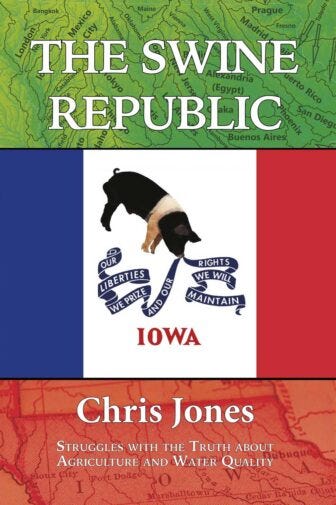Note: title is adapted from a line in Bob Dylan’s song Tombstone Blues.
You may have heard that Urbandale, a Des Moines suburb and home to one of Iowa’s largest school districts, is removing 374 books from the school library shelves in response to the new Iowa Education Reform bill (SF 496) passed this last session. The bill was passed at the urging of the advocacy group Moms for LIBERTY, ostensibly to prevent children from being exposed to the LGBTQ+ themes. Never mind that there are children with same-sex parents almost assuredly attending Urbandale schools, which to me is all the reason you need to keep such material available.
I know our species’ range of thought on its own sexuality can span from one end of the rainbow (oopsie) to other, but how Moms for LIBERTY are taken to be serious people on this or any subject is beyond mysterious to me. The latest rumor is they have petitioned Governor Reynolds to order Iowa DNR to stop stocking Rainbow Trout in our streams. Just kidding. I made that one up. On the other hand, probably better not give them any ideas.
The MsFL may think all this sex talk is a new thing, but heck, back when I was in school, the farm kids were veritable Larry Flynts at recess with their tales of livestock doing the nasty, and they clearly knew more about the topic than the average sex ed teacher. Maybe MsFL are the type that still think they’re fooling somebody with that “mom and dad were just exercising” line when their young’uns burst into the bedroom a little earlier than usual on Saturday morning. And let us not forget that one LIBERTY Mom accused the husband of another LIBERTY Mom of watching his daughter change clothes, among other naughty things. Yes, these are the people telling our legislators and governor what books should be in libraries.
Apparently sensing an opportunity to impress the fascists among us, Urbandale school officials decided to apply the new legislation to works such as 1984 (Orwell), Catch 22 (Heller), The Catcher in the Rye (Salinger), Farewell to Arms (Hemingway), The Color Purple (Walker), and Ulysses (Joyce). Because, apparently, there is sex in those books. I’ve read them all except Ulysses and while I do vaguely recall The Color Purple having some sexual themes, I’ve never heard of any person of any age reading these books for their titillating tidbits. I’ve seen Ulysses on the shelf and I can’t imagine any kid, especially one with a smartphone (which many of them obviously have), and most especially one that has grown up on a farm with livestock, wading through its 1000 pages looking for the naughty parts.
But who knows, maybe I’m so screwed up because my parents let me read 1984 before it was ‘age appropriate’. I would have thought that the age to learn about authoritarianism was AS EARLY AS POSSIBLE, but what do I know.
As contemptible as the screaming MsFL are, I’m reserving my most contempt for the Urbandale school official(s) that made the decision to apply the (supposed) legislative intent in the broadest manner. Feel free to disagree, but if you’re a teacher or a librarian or a superintendent in the public school system and 1984 is pulled from the shelves by your hand or your order, what business do you have working in education or any other scholarly pursuit? You can play the “just following orders” card all you want; just be sure to google the phrase so you can know you’ve chosen to join one of civilization’s worst clubs.
In a statement released by the Urbandale school district, officials said that “we had to take a fairly broad interpretation of the law knowing that if our interpretation was too finite, our teachers and administrators could be faced with disciplinary actions according to the new law.” (I’m clutching my hand to my chest while gasping at the thought.)
I do hope the Urbandale school board has purchased some fainting couches for the upcoming year.
Surely no organization that tolerates insubordinate behavior functions effectively, at least not for long. And for the record I understand that some people are terrified of losing their jobs, even when seemingly every profession has a shortage of workers. But in almost every organization, there are people that can afford to take risks, and these almost always are people critical to the organization; in other words, the people that would be most difficult to terminate for conscientiously objecting to what they perceive to be unjust or unethical. When these people sit by and assign a lesser value to what is just than what they assign to their ‘place’, or their stature, or their income (and many or most of them have some wealth to endure temporary hardship), or that possible promotion on the horizon, our institutions and indeed our society suffers. They in effect become endorsers of policies and practices they know cross the line. You can see this rot at so many of our country’s institutions.
As many have observed in many countries, authoritarians cannot function effectively without an acquiescent bureaucracy. And no democracy survives without a bureaucracy that can resist the majority government’s worst instincts. You can make the case that the bureaucracy exists primarily for that reason. And can banning books be seen as anything other than authoritarian? It’s the duck’s quack, the elephant’s trunk, and the skunk’s stink, all rolled into one. There’s no mistaking what a book banner is; a tough call, it is not.
I saw this repressive behavior during my own career studying water quality. It’s no secret that the ag establishment demands an authoritative role in deciding what our water and the rest of our environment should look like. They have an active role in what gets studied and what doesn’t, what gets cleaned up and what doesn’t, what the data says and what it doesn’t say, what our government agencies are going to say about it, the methods by which we are going to address our pollution problems, and most importantly, who’s going to pay for it all (spoiler alert: not them). We’re all made to think that their cornography is really literature of the highest refinement.
No small number of people working on these problems in the agencies, NGOs and academia spend their careers gingerly walking on eggshells, lest the slightest cracking noise startle the thin-skinned Big Ag Benitos. They self-censor so the next paper can get published, the next proposal gets funded, the next invite is extended, and, so no mean emails (gasp) show up in the inbox. Somehow, some way, this has gotten to be seen as honorable behavior. Most of the people I interacted with in ‘the circle’ knew the state’s approach to fixing our polluted water was wrong-headed and a waste of taxpayer resources—and that’s putting it mildly. To paraphrase Jerry Reed, Big Ag gets the mine and the public gets the shaft—it was no secret.
A few years ago, a staff person at the University of Iowa came into my office to tell me that her elderly mother enjoyed reading my blog and she (the mother) wanted to know why there was nobody ‘doing anything’. Seeing myself as one of the nobodies, I told her the public rightfully saw me and my colleagues, all of us earning good livings, as those tasked with ‘doing something’. The problem lies in the definition of ‘something’. Publishing that 27th paper on the proper nitrogen rate for corn, or the optimal dimensions for a woodchip bioreactor, rehashing the meeting outcomes of a decade ago, or determining which conservation practice is least likely to offend a farmer’s tender sensibilities, these were our somethings and by god, the public ought to appreciate our intellectual commitment to parsing out our water quality problems in such detail while we do our best to impress our peers. And believe me, this is exactly what Big Ag wants out of the universities and the NGOs because it keeps them from pressing the hard truths connected to the scale of production and the industry’s recalcitrance to change.
After two generations of this, acquiescence from the conservation and research community to the Big Ag despots can be seen in the same light as the Urbandale superintendent pulling 1984 from the shelf. This complicity helps entrench our environmental problems and the drivers of them, and in my view the current ag production system could never endure without it. It was explained to me not too long ago that in some of our institutions, opportunities for martyrdom are many and then you’re gone and forgotten. I acknowledge this reality. But there are many, many folks in the circle that have the stature and career capital that could provide cover for those that don’t. I wish they could summon the courage to do so. The quality of your streams, lakes and aquifers would be better if they did.
About my book: The Swine Republic is a collection of essays about the intersection of Iowa politics, agriculture and environment, and the struggle for truth about Iowa’s water quality. Longer chapters that examine ‘how we got here’ and ‘the path forward’ bookend the essays. Foreword was beautifully written by Tom Philpott, author of Perilous Bounty. Get a free copy of the book with a paid subscription to this substack ($30 value).






Thank you for being a truthteller. I'm currently reading Sarah Kendzior's They Knew. Your essay reminds me of it. And to be published 3 days after a former president was indicted for sedition long after the fact, helps us realize how difficult it is for what needs to be done (or not done) to be accomplished. For those of us who care about the fact that Books Build Brains and schools are for learning, even the hard-to-swallow stuff like history and about how our democracy works, and the condition of our waterways as well as our drinking and cooking water, and the regulations that need to be put in place for safeguards for all of us, let us continue to be willing to look at the truth and to continue to work toward righting wrongs. Obviously you essay has stimulated my thinking. Diana
I'd put my antique copy of 1984 in a Little Free Library, but I'm afraid Moms for Liberty would burn it!